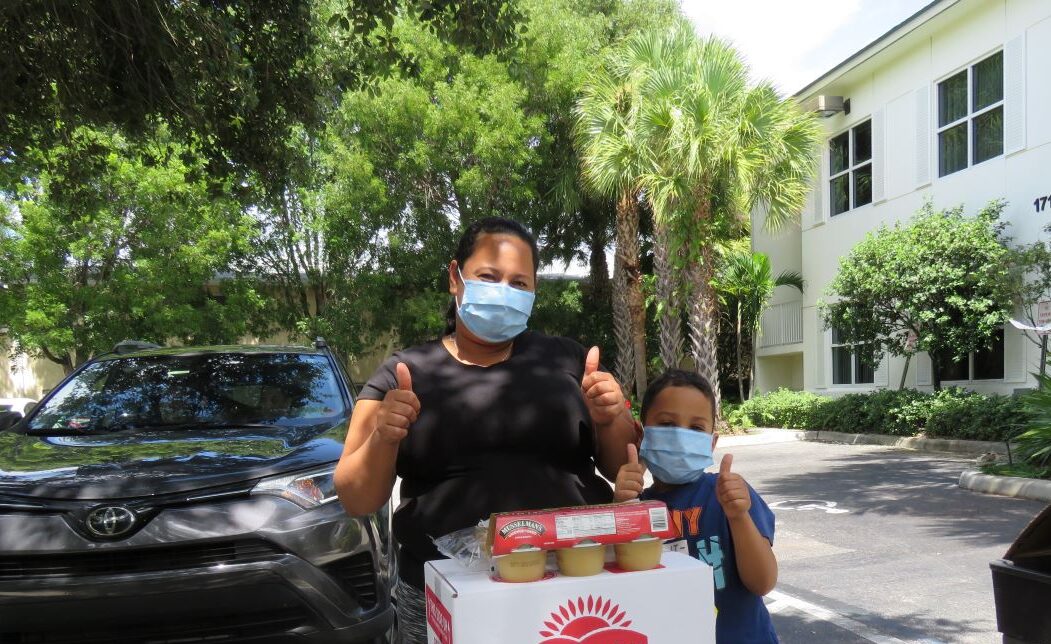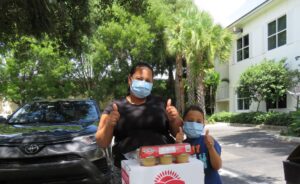
Covid-19 may have significantly altered life as we know it, but it could not stop Project Grow. When the pandemic caused Adopt-A-Family to go remote, it meant that Grow staff could no longer see students face-to-face. However, the staff was determined to find creative ways to consistently invest in the lives of their kids.
Throughout the spring and summer, staff members pursued alternative means to provide the crucial wraparound services their kindergarten through fifth-grade students needed. For the program’s students, who are formerly homeless and come from low-income backgrounds, delivering services that are proven, nuanced, and student-centered is of the utmost importance.
“Project Grow is working on building trust between the kids and the program and the people in it,” said Daron Morse, Director of Youth Educational Programs for Adopt-A-Family. “A consistent external support system is very helpful to them.”
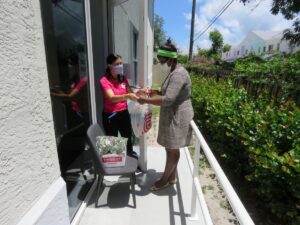
A client picks up food and supplies from the AAF office in Lake Worth.
Project Grow maintained contact with parents even when in-person interaction was untenable and discovered that an overwhelming majority experienced COVID-19-related job loss and food insecurity.
With summer approaching and pandemic-related summer camp closures mounting in the area, Adopt-A-Family recognized the importance of keeping the students engaged. In response, they designed a dynamic virtual summer camp.
Thanks to a generous program supporter, all 37 Project Grow families were provided with a new Chromebook so students could access online sessions.
While most virtual camps rely on prerecorded content, Project Grow upped the ante by designing a curriculum that featured live academic sessions and activities to foster student engagement.

Two Project Grow students participate in a virtual camp ballet class.
Students took math and science classes and participated in poetry and art workshops. They also learned yoga, ballet, and computer coding. Nature and wildlife sessions were provided by the Palm Beach Zoo, Florida Fishing Academy, and Gumbo Limbo.
Through it all, staff members wore many hats. Not only did they teach academic lessons, but they also administered technical assistance to parents and offered emotional support to the children. To help families experiencing job loss, Project Grow connected parents to job resources and opportunities for temporary financial assistance.
On Fridays, Project Grow staff handed out donated gourmet meals, snacks, toys, school supplies, and encouragement to students and parents while respecting social distancing protocols.
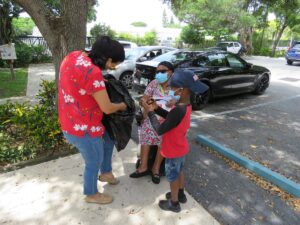
Project Grow student Jonathan and his mother Rose Marie at a July food donation event held at the Lake Worth AAF office parking lot.
It was on those Fridays that teachers got to see their students face-to-face, which resulted in jubilant greetings and smiles. One Friday in July, 4th and 5th grade teacher Mr. Evan greeted a student named Jonathan and gave him some snacks and his mother a box of food.
The multitude of challenges posed by the pandemic revealed Project Grow’s malleability, innovation, and attentiveness in how it serves its students.
When the Palm Beach County School Board voted to postpone the start of the school year in late July, Project Grow extended its summer camp for four more weeks to ensure student enrichment was fostered until the first day of school.
“We don’t want a gap to occur where the kids lose practice in engaging with their peers and teachers, Ms. Daron said. “That’s a big step in a kid’s development.”
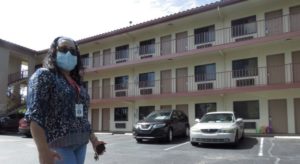
Before COVID-19 changed everything, service delivery used to be a family affair. Parents and case managers met – often for an hour or more – to talk about the family’s struggles, create budgets, and implement family action plans, while the children colored or played on the floor nearby.
At Adopt-A-Family, our work has always been about those face-to-face touchpoints, where staff can look clients square in the eye and say, “I believe in you and in your ability to get through this and come out stronger. I’m here to help.”
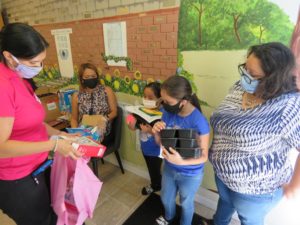
Daron Morse and Odet Rodriguez of Project Grow hand out food, games, and school supplies to students.
Since the first case of COVID-19 was diagnosed in Florida, we shifted almost overnight to virtual and contactless service delivery. For every case manager in every program, that means relying on phone calls and teleconferencing platforms to stay in touch – a tough proposition in a field predicated on human interaction.
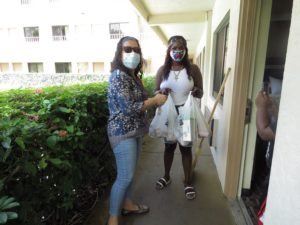
Isabel Steube delivers groceries to one of her clients in early May.
And at the same time, there are more people than ever who need our help.
The Housing Stabilization Program (HSP), which provides rent and utility assistance to families at risk of homelessness, has seen a dramatic spike in calls from people experiencing job and income loss. To meet the demand, HSP hired three additional staff members and implemented an expedited virtual intake process. From March-June 2020, the Housing Stabilization Program provided emergency rent and utility assistance to 110 families, double the caseload for the same period in 2019.
The Homeless Resource Center (HRC) team responds every day to families in crisis. In May alone, 17 families were housed with Rapid Re-Housing assistance, 16 families were placed in emergency shelter, and three were moved to permanent supportive housing. “These clients still need us. They need showers. They need clothes. We can’t stop because of the coronavirus,” said Abbey Hartman, Shelter Services Coordinator at Adopt-A-Family’s 19-unit family homeless shelter.
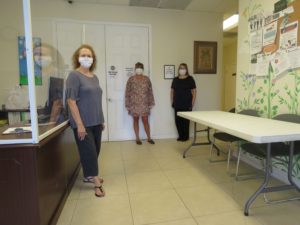
AAF staff at Program REACH wear face masks and practice social distancing when tending to clients.
Fieldwork is starkly different. HRC case managers used to make 20 home visits per week, sitting at each family’s table and exploring what was going well and what wasn’t. Now, brief exchanges take place at the front door. Smiling through their masks, case managers drop off groceries, toiletries, diapers, cleaning products – anything to help the family get by.
As for the agency’s six residential programs, all remain at capacity and no one will ever be evicted because they lost their job to coronavirus and can’t pay the rent. The agency continues to provide housing and emergency shelter to over 120 families on any given night, with new safety protocols in place.
Family Advocate Vivenne Owen, who normally enjoys face-to-face interactions with her Project SAFE clients, still comes to the office at least once a week. When clients see her car in the parking lot, they pop over and visit – wearing masks, of course. Even when she’s working at home, she is available and present for her clients by phone or video. Like every Adopt-A-Family team member, she’s working hard every day to remind her clients one reassuring thing in a frightening time: “We’re still there.”
